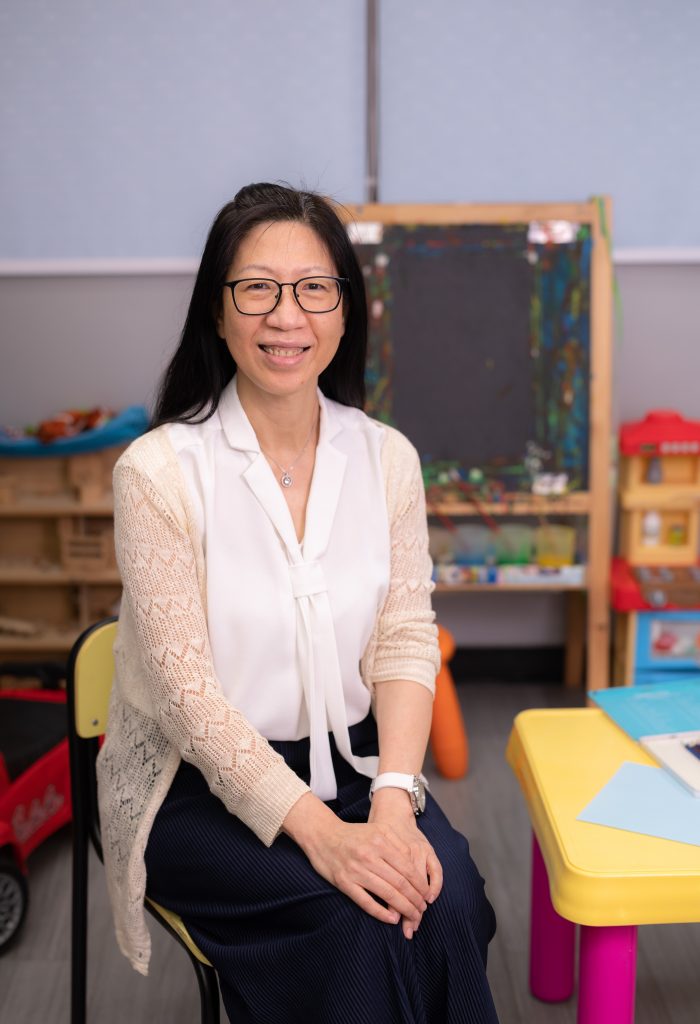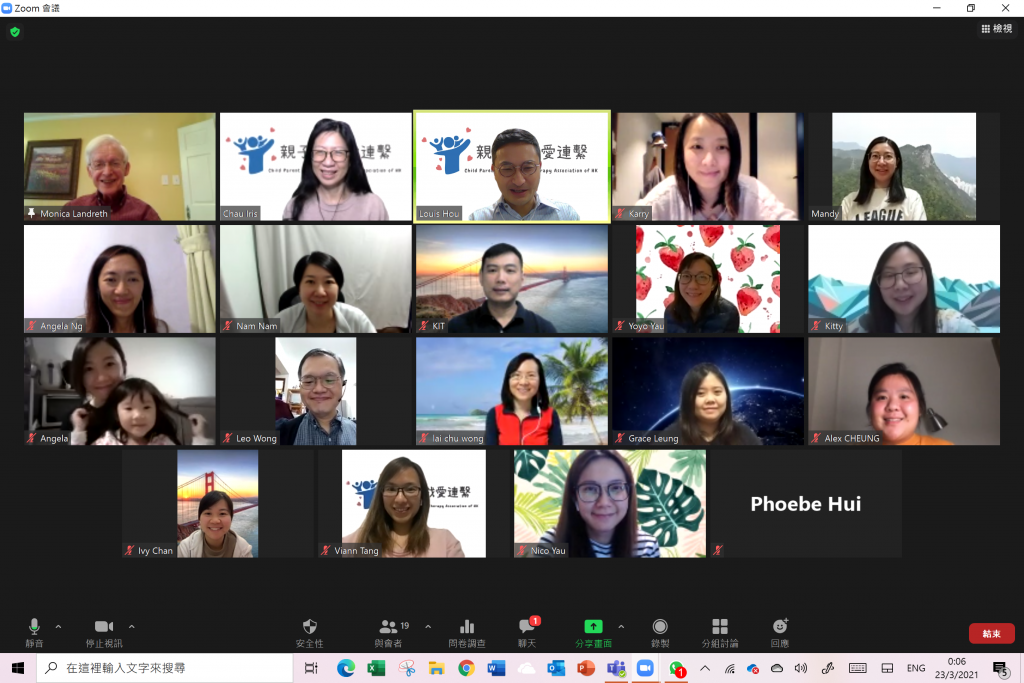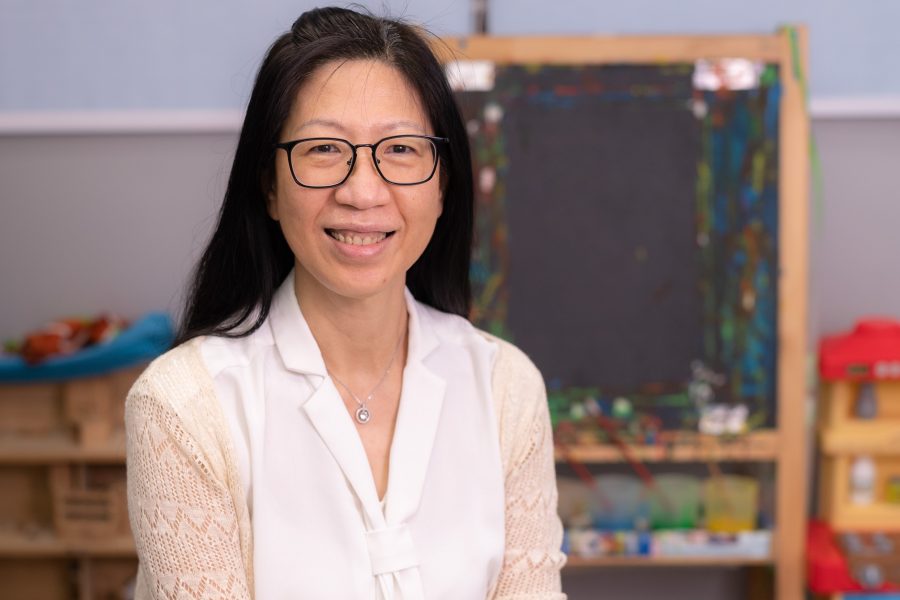As early as in the 1920’s, therapists in Europe pioneered the use of play in understanding and treating children. Child-centred Play Therapy was pratised in the 1940’s in the USA while Filial Therapy (Child Parent Relationship Therapy) made its debut in the 1960s. In addition to providing counselling services to children, Dr. Iris Chau, one of the leading experts in play therapy in Hong Kong, established the Child Parent Relationship Therapy Association of Hong Kong in 2020 to train parents to become their children’s trusted counsellors and play a major role in helping their kids to better express their inner worlds, which in turn will prevent mental and behavioural issues and foster parent-child communication and bonding.

Turning toys into children’s vocabulary
While play therapy is not a new concept in Hong Kong, only a few truly understand what it does. Dr. Chau explains, “Play therapy is counselling for children. As children cannot express themselves verbally as well as adults can, we encourage them to use toys as their vocabulary to express their experiences and feelings. If a little boy struggles to talk about what happened after being disciplined by a teacher, for instance, he can recreate the scenario where he is the teacher and I am the student. When he raises the question of what is 10 plus two, I can quietly ask him what my answer should be. If he says 14, I will repeat after him. Then, he will respond, ‘Wrong! You did not pay attention in class!’ By recreating the scenario, he is able to express to me that he was disciplined for giving an incorrect answer, which made him sad. Both adults and children can mitigate their negative emotions by sharing them with others – counselling and treatments are founded on similar grounds. Adults use words for expression, children with toys. After all, how can we expect children to express themselves verbally, especially when it comes to abstract emotions? I once treated a child who thought her parents played favourites. Born with a twin brother, she played with a pair of boy and girl dolls every time she entered the playroom. ‘They are twins,’ she introduced inadvertently. By projecting her own experiences onto the dolls, she was able to share her woes of thinking that her brother was adored by the entire family, while she was the least favourite child. Children’s inner thoughts cannot be surmised, which is why play therapy is conducted in a child-centred approach without any agenda. We usually let children choose their favourite toys freely for 30 to 45 minutes upon entering the playroom. Their play patterns may be random at first but will soon convey a theme. In a domestic abuse case, for example, the child in question trapped the doll in a dollhouse by barricading all the doorways with furniture, which could be interpreted as his/her feeling of helplessness.”
Should we follow up after children have expressed their emotions? Dr. Chau says, “If I notice scenarios that can be taken care of by family members, such as sibling rivalry or domestic violence, I will advise the parents. If parents make the effort to bring changes to the situation, the issue can usually be resolved more quickly.”
The Child Parent Relationship Therapy Association of Hong Kong services grassroots families
In 2020, Dr. Chau founded the Child Parent Relationship Therapy Association of Hong Kong to emphasize and promote the role of child parent relationship in therapy. “As a child psychologist, I am passionate about social responsibilities and how I can contribute my knowledge and professional skills. The pandemic has brought countless challenges to families while many parents even described being ‘trapped’ with their kids at home all day. I kept on asking myself what I could do to help. My mentor, who lives in the US and is now over 80 years old, still shares his insights via videos and encourages therapists to teach parents to do play therapy sessions with their children. Inspired by him, I decided to contribute to the local community as my graduate thesis was precisely about family play and parent-child relationship therapy. Considering that there are not enough play therapists in Hong Kong, and one-on-one sessions with parents are inefficient, I decided to do it differently. First, I recruited over 30 trainers from my students and former students at the University of Hong Kong and via Facebook in April last year. Candidates must have a degree in social work or counselling, as well as related work experience and play-therapy training. These trainers would provide training to the parents from grassroots families. I provided the trainers with programme materials and relevant training. The trainers received supervision from myself and another expert in the field of play therapy, Ms Lottie Lau. It was with great honour that my mentor, Dr. Garry Landreth, also offered group supervision via Zoom. Around 200 parents were referred by schools and churches to participate in our first training. We were delighted to have received positive feedback from parents after completing the six Zoom classes.”

Child Parent Relationship Therapy Association of Hong Kong, and Dr. Iris Chau.
The first three sessions teach basic theories and techniques like recognizing children’s emotions, understanding play therapy and accepting children as they are. Every session comes with homework, such as the “30-second explosion”, in which parents are requested to halt a phone conversation should their child asks for attention. The parents should ask the other party on the phone to give them some time as they kneel to listen to what their child has to say, and tell him/her that they will be right with him/her after the call. Children will be satisfied with just a little bit of attention. Another game is called “a sandwich hug”, in which the parents assume the role of the bread slices and the child pretends to be the filling while they hug one another tightly like a sandwich. Parents are also taught to observe their children’s emotions, replace questions like “why are you crying” with emphatic statements such as “I know you are very upset” when reacting to their feelings. They will soon be amazed with their children’s behavioural changes.
Following the first three theory sessions are three sessions on play. There are no playrooms at home, but the Association provides parents with toy sets to conduct play therapy with children within the comfort of their own four walls. “Some grassroots families do not have tables at home, so children can only play on their bunk beds. Nonetheless, children still enjoy their playtime as long as parents are willing to spend time with them and try to understand them.”
Children as directors
The toy set consists of different kinds of toys, such as feeding bottles, cooking utensils as well as pretend weapons and handcuffs– especially included for children to express aggression when necessary. There are also creative toys like art supplies and crayons. Parents would video-record their playtime with children and show it to the class. The trainers would then offer their advice on improving their communication with children. Dr. Chau explains, “Our training aims to empower parents without overcorrecting their actions, so that parents can better understand their children. Children enjoy playtime as they get their parents’ full attention and can freely express themselves during this period. Most parent-child conversations are of disciplining or fishing for information parents want to know: they are rarely focused on what children want to say. When we play with children, we allow them to become the ‘director’, as nobody understands their needs as well as they do. On a day that they do not feel like chatting and thirst for a sense of accomplishment, they can choose to only do things that guarantee success, such as playing darts at a close distance so every shot hits the bull’s eye, or racing with parents who let them win. Children will work hard to satisfy their personal desires, so parents need not and should not set a framework for them.”
In October 2021, the Association has successfully trained more than 700 parents. Dr. Chau has realized parents’ eagerness to learn and become their children’s counsellors. Many of them also changed their parenting style after attending her programme. “It requires learning to be a parent. Why do parents learn how to change diapers and bathe their newborns, but not about parenting? Many of us just blindly follow our parents’ parenting style or other people’s guidance by default, yet if we fail, it will be our children who suffer as a result. As parents master the role of their children’s counsellors and improve their parenting styles for the better, they can not only handle minor issues in the household without consulting a professional, but also reduce the number of family issues and stop them from snowballing into bigger ones in the future.” Dr. Chau believes that the earlier parents receive training, the better they can understand their children. This is why she hopes that more parents with younger children will join her programme. For more details, please visit: https://www.cprthk.org/.
Dr. Iris Chau encourages parents to spend time with their children on a regular basis, such as hanging out with them at least once a week. “Without a regular pattern, it would seem like parents are using children to fill their free time. If parents spend time with their children this week but not the next, children will be disappointed, which eventually may turn into frustration. Time with children is just like any important appointment – only consider cancelling under extreme weather or if you feel ill. For quality parentchild time, we must give children all our attention without interruptions from phones and other distractions. I value communication. We often say we love our children, yet how can our little ones feel our love when we do not spend enough time with them? Quality time does not have to last all night – even half an hour or an hour is sufficient if you really devote your time and energy to them. If you have more than one child, you will need to schedule your time to hang out with each of them individually. Back in the day, wives must compete for the attention of a polygamous emperor. Similarly, children will attempt to grab parents’ attention by being mischievous, acting crazy or causing trouble. An elder sister may eventually give up on expressing herself if her younger brother keeps interrupting her when she tries to start a conversation with their mother. In addition, mum and dad should spend time with their children separately. Time spent with all family members can only be considered ‘family time’. In many single-child households, the child would only show affection to his/her mother, leaving the father feeling rejected. Therefore, fathers must spend time with children individually so they can foster a healthy bond with each other as in any three-person relationship, there is always one outsider.” ~ Helena Hui

